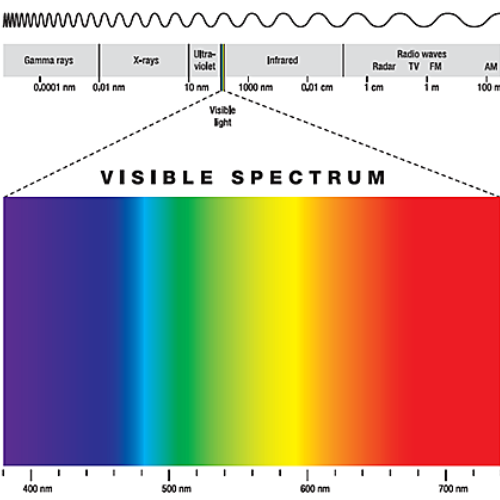
Why Choosing Glasses with a Blue Light Blocking Filter?
Blue light is ubiquitous in our lives and has been the subject of much discussion lately.
The potential danger on our health and its link with various eye diseases, pushes Man to adapt accordingly. New alternatives have therefore emerged to protect ourselves effectively.
Glasses with a blue light blocking filter have become particularly useful and appreciated by many people spending time in front of their screens.
The Danger of Blue Light

Blue light is part of visible light, the region of the electromagnetic spectrum that the human eye is able to perceive.
It is emitted by natural sources such as the sun, as well as by artificial sources such as electronic devices.
On average, the human eye can perceive wavelengths between 390 and 750 nm. Some people can perceive wavelengths between 380 and 780 nm.
Thus, 25% of white light is actually blue light, a natural and necessary component of light, with a wavelength between about 380 nm and 475 nm (i.e. the lowest part of the light spectrum)

Visible light is composed of rays of different colors, blue being one of them. The wavelength of each of the rays that make up the visible spectrum is different, the infrared being the longest and the ultraviolet the shortest.
The colors we perceive are the result of the reflection of a wavelength on a surface and the absorption of others
In other words, if we see a red object, it is because its surface reflects the wavelength of the color red and absorbs the other colors.
When visible light passes through a prism, it decomposes, revealing the different rays that make it up. Rainbows are an example of refraction of the visible spectrum.
The blue-turquoise or blue-violet light is the light whose wavelength is the shortest and which has the most energy.
Blue-violet light, or high-energy visible light, can cause eye strain and eye fatigue, as well as the early onset of AMD (age-related macular degeneration), one of the leading causes of blindness in the world.
Blue-violet light therefore negatively affects the cells of the macula, a light-sensitive tissue located at the back of the eye.
It is important to know that the cells that make up the macula have no capacity for regeneration
However, blue-turquoise light has important health benefits. It is responsible for resetting the body clock, which regulates sleep and wake cycles, body temperature, and cognitive and memory processes.
When the biological clock does not function as it should, the body suffers from various problems such as chronic fatigue, disorientation, mood swings, stomach disorders, general malaise, etc.
Blue light is also linked to the pupillary constriction reflex, a natural mechanism of the retina to protect the eyes from excessive light.
Turquoise-blue light rays are also important for correct color perception and good visual acuity as part of visible light.
Blue Light Blocking Glasses & Other Options

Just below, we have put together for you some simple alternatives to glasses with a filter to reduce blue light.
- Blocking Blue Light Apps
Alternatively, you can always download some blue light filtering applications.
F.lux is probably the best known application, it allows you to adjust the blue light percentage of your Windows or MacOS device. This software is very easy to install and is famous for its lighting programs that change every day.
Twilight, Darker and Dimly are three other well-known applications to filter blue light for free.
These applications are interesting alternatives because they are free.
If you don't consider protecting your eyes a priority, it might be a good idea to look into these options.
- Optimizing your Screen Time
Avoid working/playing extensively in front of screens before going to bed.
When you look at a screen when the room is already dark, it causes the pupil to open and a particularly large amount of blue light can penetrate unimpeded.
However, you should not give up entertaining yourself at night in front of the television or on your video games.
Your screen is usually far away from the eye and emits less white (and therefore blue) light due to the constantly changing colored images, which causes fewer problems.
It is also important to have another light source in the room.
- Eye Relaxation
Always take the time to give your eyes a break, especially when you are working for a long time in front of the computer.
There are many techniques to help you rest your eyes, while making them more trained.
In this article (click here), we have listed several particularly effective techniques to make your eyes stronger than they have ever been.
- Blue Light Blocking Glasses
A graphic designer can't work like this. A gamer can quickly be annoyed if the colors of his favorite video game are modified.
On the other hand, they only help in a limited way - the blue light in the room, for example with LED lighting, or the natural blue light is not attenuated.
If you are one of those people who spend several hours a day in front of a computer or smartphone, it is recommended to wear glasses with blue light filtering lenses.
Don't worry, there's no need to color the lenses in yellow-orange!
At GMG Performance, we offer a range of glasses with transparent blue light filters.
This solution is particularly popular with designers and gamers.
It allows you to protect your eyes more effectively than with an application, while keeping the original colors of your screens. So what are you waiting for?


